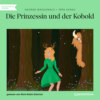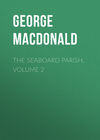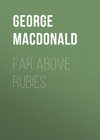Buch lesen: «St. George and St. Michael», Seite 24
CHAPTER XLI
GLAMORGAN
The winter passed, with much running to and fro, in foul weather and fair; and still the sounds of war came no nearer to Raglan, which lay like a great lion in a desert that the hunter dared not arouse. The whole of Wales, except a castle or two, remained subject to the king; and this he owed in great measure to the influence and devotion of the Somersets, his obligation to whom he seemed more and more bent on acknowledging.
One day in early summer lady Margaret was sitting in her parlour, busy with her embroidery, and Dorothy was by her side assisting her, when lord Herbert, who had been absent for many days, walked in.
'How does my lady Glamorgan?' he said gaily.
'What mean you, my Herbert?' returned his wife, looking in his eyes somewhat eagerly.
'Thy Herbert am I no more; neither plume I myself any more in the spare feathers of my father. Thou art, my dove, as thou deservest to be, countess of Glamorgan, in the right of thine own husband, first earl of the same; for such being the will of his majesty, I doubt not thou wilt give thy consent thereto, and play the countess graciously. Come, Dorothy, art not proud to be cousin to an earl?'
'I am proud that you should call me cousin, my lord,' answered Dorothy; 'but truly to me it is all one whether you be called Herbert or Glamorgan. So thou remain thou, cousin, and my friend, the king may call thee what he will, and if thou art pleased, so am I.'
It was the first time she had ever thou'd him, and she turned pale at her own daring.
'St. George! but thou hast well spoken, cousin!' cried the earl. 'Hath she not, wife?'
'So well that if she often saith as well, I shall have much ado not to hate her,' replied lady Glamorgan. 'When didst thou ever cry "well spoken" to thy mad Irishwoman, Ned?'
'All thou dost is well, my lady. Thou hast all the titles to my praises already in thy pocket. Besides, cousin Dorothy is young and meek, and requireth a little encouragement.'
'Whereas thy wife is old and bold, and cares no more for thy good word, my new lord of Glamorgan?'
Dorothy looked so grave that they both fell a-laughing.
'I would thou couldst teach her a merry jest or two, Margaret,' said the earl. 'We are decent people enough in Raglan, but she is much too sober for us. Cheer up, Dorothy! Good times are at hand: that thou mayest not doubt it, listen—but this is only for thy ear, not for thy tongue: the king hath made thy cousin, that is me, Edward Somerset, the husband of this fair lady, generalissimo of his three armies, and admiral of a fleet, and truly I know not what all, for I have yet but run my eye over the patent. And, wife, I verily do believe the king but bides his time to make my father duke of Somerset, and then one day thou wilt be a duchess, Margaret. Think on that!'
Lady Glamorgan burst into tears.
'I would I might have a kiss of my Molly!' she cried.
She had never before in Dorothy's hearing uttered the name of her child since her death. New dignity, strange as it may seem to some, awoke suddenly the thought of the darling to whom titles were but words, and the ice was broken. A pause followed.
'Yes, Margaret, thou art right,' said Glamorgan at length; 'it is all but folly; yet as the marks of a king's favour, such honours are precious.'
As to what a king's favour itself might be worth, that my lord ofGlamorgan lived to learn.
'It is I who pay for them,' said his wife.
'How so, my dove?'
'Do they not cost me thee, Herbert—and cost me very dear? Art not ever from my sight? Wish I not often as I lay awake in the dark, that we were all in heaven and well over with the foolery of it? The angels keep Molly in mind of us!'
'Yes, my Peggy, it is hard on thee, and hard on me too,' said the earl tenderly, 'yet not so hard as upon our liege lord, the king, who selleth his plate and jewels.'
'Pooh! what of that then, Herbert? An' he would leave me thee, he might have all mine, and welcome; for thou knowest, Ned, I but hold them for thee to sell when thou wilt.'
'I know; and the time may come, though, thank God, it is not yet. What wouldst thou say, countess, if with all thy honours thou did yet come to poverty? Canst be poor and merry, think'st thou?'
'So thou wert with me, Herbert—Glamorgan, I would say, but my lips frame not themselves to the word. I like not the title greatly, but when it means thee to me, then shall I love it.'
'Art thou poor, yet hast thou golden slumbers?
O sweet content!'
—sang the earl in a mellow tenor voice.
'My lord, an' I have leave to speak,' said Dorothy, 'did you not say the diamond in that ring Richard Heywood sent me was of some worth?'
'I did, cousin. It is a stone of the finest water, and of good weight, though truly I weighed it not.'
'Then would I cast it in the king's treasury, an' if your lordship would condescend to be the bearer of such a small offering.'
'No, child; the king robs not orphans.'
'Did the King of Kings rob the poor widow that cast in her two mites, then?'
'No; but perhaps the priests did. Still, as I say, the hour may come when all our mites may be wanted, and thine be accepted with the rest, but my father and I have yet much to give, and shall have given it before that hour come. Besides, as to thee, Dorothy, what would that handsome roundhead of thine say, if instead of keeping well the ring he gave thee, thou had turned it to the use he liked the least?'
'He will never ask me concerning it,' said Dorothy, with a faint smile.
'Be not over-sure of it, child. My lady asks me many things I never thought to tell her before the priest made us one. Dorothy, I have no right and no wish to spy into thy future, and fright thee with what, if it come at all, will come peacefully as June weather. I have not constructed thy horoscope to cast thy nativity, and therefore I speak as one of the ignorant; but let me tell thee, for I do say it confidently, that if these wars were once over, and the king had his own again, there will be few men in his three kingdoms so worthy of the hand and heart of Dorothy Vaughan as that same roundhead fellow, Richard Heywood. I would to God he were as good a catholic as he is a mistaken puritan! And now, my lady, may I not send thy maiden from us, for I would talk with thee alone of certain matters—not from distrust of Dorothy, but that they are not my own to impart, therefore I pray her absence.'
The parliament having secured the assistance of the Scots, and their forces having, early in the year, entered England, the king on his side was now meditating an attempt to secure the assistance of the Irish catholics, to which the devotion of certain of the old catholic houses at home encouraged him. But it was a game of terrible danger, for if he lost it, he lost everything; and that it should transpire before maturity would be to lose it absolutely; for the Irish catholics had, truly or falsely, been charged with such enormities during the rebellion, that they had become absolutely hateful in the eyes of all English protestants, and any alliance with them must cost him far more in protestants than he could gain by it in catholics. It was necessary therefore that he should go about it with the utmost caution; and indeed in his whole management of it, the wariness far exceeded the dignity, and was practised at the expense of his best friends. But the poor king was such a believer in his father's pet doctrine of the divine right of his inheritance, that not only would he himself sacrifice everything to the dim shadow of royalty which usurped the throne of his conscience, but would, without great difficulty or compunction, though not always without remorse, accept any sacrifice which a subject might have devotion enough to bring to the altar before which Charles Stuart acted as flamen.
In this my story of hearts rather than fortunes, it is not necessary to follow the river of public events through many of its windings, although every now and then my track will bring me to a ferry, where the boat bearing my personages will be seized by the force of the current, and carried down the stream while crossing to the other bank.
It must have been, I think, in view of his slowly-maturing intention to employ lord Herbert in a secret mission to Ireland with the object above mentioned, that the king had sought to bind him yet more closely to himself by conferring on him the title of Glamorgan. It was not, however, until the following year, when his affairs seemed on the point of becoming desperate, that he proceeded, possibly with some protestant compunctions, certainly with considerable protestant apprehension, to carry out his design. Towards this had pointed the relaxation of his measures against the catholic rebels for some time previous, and may to some have indicated hopes entertained of them. It must be remembered that while these catholics united to defend the religion of their country, they, like the Scots who had joined the parliament, professed a sincere attachment to their monarch, and in the persons of their own enemies had certainly taken up arms against many of his.
Meantime the Scots had invaded England, and the parliament had largely increased their forces in the hope of a decisive engagement; but the king refused battle and gained time. In the north prince Rupert made some progress, and brought on the battle of Marston Moor, where the victory was gained by Cromwell, after all had been regarded as lost by the other parliamentary generals. On the other hand, the king gained an important advantage in the west country over Essex and his army.
The trial and execution of Laud, who died in the beginning of the following year, obeying the king rather than his rebellious lords, was a terrible sign to the house of Raglan of what the presbyterian party was capable of. But to Dorothy it would have given a yet keener pain, had she not begun to learn that neither must the excesses of individuals be attributed to their party, nor those of his party taken as embodying the mind of every one who belongs to it. At the same time the old insuperable difficulty returned; how could Richard belong to such a party?
CHAPTER XLII
A NEW SOLDIER
Moments had scarcely passed after Dorothy left him at the fountain, ere Scudamore grievously repented of having spoken to her in such a manner, and would gladly have offered apology and what amends he might.
But Dorothy, neither easily moved to wrath, nor yet given to the nourishing of active resentment, was not therefore at all the readier to forget the results of moral difference, or to permit any nearer approach on the part of one such as her cousin had shown himself. As long as he continued so self-serene and unashamed, what satisfaction to her or what good to him could there be in it, even were he to content himself with the cousinly friendship which, as soon as he was capable of it, she was willing to afford him? As it was now, she granted him only distant recognition in company, neither seeking nor avoiding him; and as to all opportunity of private speech, entirely shunning him. For some time, in the vanity of his experience, he never doubted that these were only feminine arts, or that when she judged him sufficiently punished, she would relax the severity of her behaviour and begin to make him amends. But this demeanour of hers endured so long, and continued so uniform, that at length he began to doubt the universality of his experience, and to dread lest the maiden should actually prove what he had never found maiden before, inexorable. He did not reflect that he had given her no ground whatever for altering her judgment or feeling with regard to him. But in truth her thoughts rarely turned to him at all, and while his were haunting her as one who was taking pleasure in the idea that she was making him feel her resentment, she was simply forgetting him, busy perhaps with some self-offered question that demanded an answer, or perhaps brooding a little over the past, in which the form of Richard now came and went at its will.
So long as Rowland imagined the existence of a quarrel, he imagined therein a bond between them; when he became convinced that no quarrel, only indifference, or perhaps despisal, separated them, he began again to despair, and felt himself urged once more to speak. Seizing therefore an opportunity in such manner that she could not escape him without attracting very undesirable attention, he began a talk upon the old basis.
'Wilt thou then forgive me nevermore, Dorothy?', he said humbly.
'For what, Mr. Scudamore?'
'I mean for offending thee with rude words.'
'Truly I have forgotten them.'
'Then shall we be friends?'
'Nay, that follows not.'
'What quarrel then hast thou with me?'
'I have no quarrel with thee; yet is there one thing I cannot forgive thee.'
'And what is that, cousin? Believe me I know not. I need but to know, and I will humble myself.'
'That would serve nothing, for how should I forgive thee for being unworthy? For such thing there is no forgiveness. Cease thou to be unworthy, and then is there nothing to forgive. I were an unfriendly friend, Rowland, did I befriend the man who befriendeth not himself.'
'I understand thee not, cousin.'
'And I understand not thy not understanding. Therefore can there be no communion between us.'
So saying Dorothy left him to what consolation he could find in such china-pastoral abuse as the gallants of the day would, with the aid of poetic penny-trumpet, cast upon offending damsels—Daphnes and Chloes, and, in the mood, heathen shepherdesses in general. But, fortunately for himself, how great soever had been the freedom with which he had lost and changed many a foolish liking, he found, let his hopelessness or his offence be what it might, he had not the power to shake himself free from the first worthy passion ever roused in him. It had struck root below the sandy upper stratum of his mind into a clay soil beneath, where at least it was able to hold, and whence it could draw a little slow reluctant nourishment.
During his poetic anger, he wrote no small amount of fair verse, tried by the standard of Cowley, Carew, and Suckling, so like theirs indeed that the best of it might have passed for some of their worst, although there was not in it all a single phrase to remind one of their best. But when the poetic spring began to run dry, he fell once more into a sort of wilful despair, and disrelished everything, except indeed his food and drink, so much so that his master perceiving his altered cheer, one day addressed him to know the cause.
'What aileth thee, Rowland?' he said kindly. 'For this se'en-night past, thou lookest like one that oweth the hangman his best suit.'
'I rust, my lord,' said Rowland, with a tragic air of discontent.
The notion had arisen in his foolish head that the way to soften the heart of Dorothy would be to ride to the wars, and get himself slain, or, rather severely but not mortally wounded. Then he would be brought back to Raglan, and, thinking he was going to die, Dorothy would nurse him, and then she would be sure to fall in love with him. Yes—he would ride forth on the fellow Heywood's mare, seek him in the field of battle, and slay him, but be himself thus grievously wounded.
'I rust, my lord,' he said briefly.
'Ha! Thou wouldst to the wars! I like thee for that, boy. Truly the king wanteth soldiers, and that more than ever. Thou art a good cupbearer, but I will do my best to savour my claret without thee. Thou shalt to the king, and what poor thing my word may do for thee shall not be wanting.'
Scudamore had expected opposition, and was a little nonplussed. He had judged himself essential to his master's comfort, and had even hoped he might set Dorothy to use her influence towards reconciling him to remain at home. But although self-indulgent and lazy, Scudamore was constitutionally no coward, and had never had any experience to give him pause: he did not know what an ugly thing a battle is after it is over, and the mind has leisure to attend to the smarting of the wounds.
'I thank your lordship with all my heart,' he said, putting on an air of greater satisfaction than he felt, 'and with your lordship's leave would prefer a further request.'
'Say on, Rowland. I owe thee something for long and faithful service. An' I can, I will.'
'Give me the roundhead's mare that I may the better find her master.'
For Lady was still within the walls. The marquis could not restore her, but neither could he bring himself to use her, cherishing the hope of being one day free to give her back to a reconciled subject. But alas! there were very few horses now in Raglan stalls.
'No, Rowland,' he said, 'thou art the last who ought to get any good of her. It were neither law nor justice to hand the stolen goods to the thief.'
He sat silent, and Rowland, not very eager, stood before him in silence also, meaning it to be read as indicating that to the wars except on that mare's back he would not ride. But the thought of the marquis had now taken another turn.
'Thou shalt have her, my boy. Thou shalt not rust at home for the sake of a gouty old man and his claret. But ere thou go, I will write out certain maxims for thy following both in the field and in quarters. Ere thou ride, look well to thy girths, and as thou ridest say thy prayers, for it pleaseth not God that every man on the right side should live, and thou mayst find the presence in which thou standest change suddenly from that of mortal man to that of living God. I say nothing of orthodoxy, for truly I am not one to think that because a man hath been born a heretic, which lay not in his choice, and hath not been of his parents taught in the truth, that therefore he must howl for ever. Not while blessed Mary is queen of heaven, will all the priests in Christendom persuade me thereof. Only be thou fully persuaded in thine own mind, Rowland; for if thou cared not, that were an evil thing indeed. And of all things, my lad, remember this, that a weak blow were ever better unstruck. Go now to the armourer, and to him deliver my will that he fit thee out as a cuirassier for his majesty's service. I can give thee no rank, for I have no regiment in the making at present, but it may please his majesty to take care of thee, and give thee a place in my lord Glamorgan's regiment of body-guards.'
The prospect thus suddenly opened to Scudamore of a wider life and greater liberty, might have dazzled many a nobler nature than his. Lord Worcester saw the light in his eyes, and as he left the room gazed after him with pitiful countenance.
'Poor lad! poor lad!' he said to himself; 'I hope I see not the last of thee! God forbid! But here thou didst but rust, and it were a vile thing in an old man to infect a youth with the disease of age.'
Rowland soon found the master of the armoury, and with him crossed to the keep, where it lay, above the workshop. At the foot of the stair he talked loud, in the hope that Dorothy might be with the fire-engine, which he thought he heard at work, and would hear him. Having chosen such pieces as pleased his fancy, and needed but a little of the armourer's art to render them suitable, he filled his arms with them, and following the master down, contrived to fall a little behind, so that he should leave the tower before him, when he dropped them all with a huge clatter at the foot of the stair. The noise was sufficient, for it brought out Dorothy. She gazed for a moment as, pretending not to have seen her, he was picking them up with his back towards her.
'Do I see thee arming at length, cousin?' she said. 'I congratulate thee.'
She held out her hand to him. He took it and stared. The reception of his noisy news was different from what he had been vain enough to hope. So little had Dorothy's behaviour in the capture of Rowland enlightened him as to her character!
'Thou wouldst have me slain then to be rid of me, Dorothy?' he gasped.
'I would have any man slain where men fight,' returned Dorothy, 'rather than idling within stone walls!'
'Thou art hard-hearted, Dorothy, and knowest not what love is, else wouldst thou pity me a little.'
'What! art afraid, cousin?'
'Afraid! I fear nothing under heaven but thy cruelty, Dorothy.'
'Then what wouldst thou have me pity thee for?'
'I would, an' I had dared, have said—Because I must leave thee. But thou wouldst mock at that, and therefore I say instead—Because I shall never return; for I see well that thou never hast loved me even a little.'
Dorothy smiled.
'An' I had loved thee, cousin,' she rejoined, 'I had never let thee rest, or left soliciting thee, until thou hadst donned thy buff coat and buckled on thy spurs, and departed to be a man among men, and no more a boy among women.'
So saying she returned to her engine, which all the time had been pumping and forcing with fiery inspiration.
Scudamore mounted and rode, followed by one of the grooms. He found the king at Wallingford, presented the marquis's letter, proffered his services, and was at once placed in attendance on his majesty's person.
In the eyes of most of his comrades the mare he rode seemed too light for cavalry work, but she made up in spirit and quality of muscle for lack of size, and there was not another about the king to match in beauty the little black Lady. Sweet-tempered and gentle although nervous and quick, and endowed with a rare docility and a faith which supplied courage, it was clear, while nothing was known of her pedigree, both from her form and her nature, that she was of Arab descent. No feeling of unreality in his possession of her intruding to disturb his satisfaction in her, Scudamore became very fond of her. Having joined the army, however, only after the second battle of Newbury, he had no chance till the following summer of learning how she bore herself in the field.




















